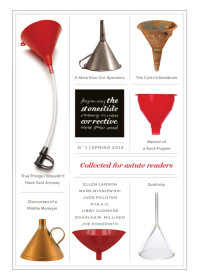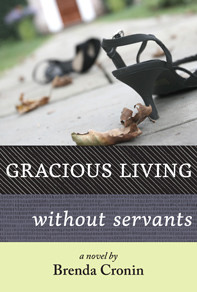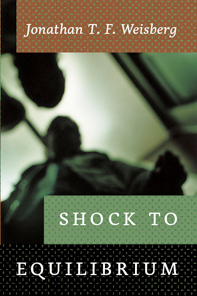by Tia Creighton
I wouldn’t call my dad cheap. He was crafty. With five kids on a teacher’s salary he had to be. I remember going into Macy’s one time with him and my brother Toby to buy Toby a pair of slacks for an upcoming family wedding. Toby picked out a pair that came with a cheap, nearly burlap belt included in the loops. My dad held up the pants, said, “Fine,” then stepped over to the rack of belts for sale. He switched out the gratis belt for a new, black, leather one and took the pants to the counter for purchase. The clerk didn’t catch on that the new belt was not meant as part of the ensemble and rang up the pants. Sure it was shoplifting, but my dad called it “Tricks of Life.”
My dad would do lots of stuff like that. When it came time to shingle Pine Street, he only did the sides that could be seen from the street. When his muffler fell off, he replaced it by wiring a supersized Alpo dog food can to the exhaust pipe. From then on, he would simply replace the can whenever it got a hole in it.
In 1976 and 1977 the reservoirs in Marin County, which supply 75 percent of the county’s water, nearly went dry. Residents were required to cut back their water use by 65 percent. The entire county let its lawns go brown. Everyone put a brick in their toilet tanks so the tanks would fill with less water and use less per flush. Some families were digging wells on their property and using that water for landscaping. Many families were saving water from their washing machines into 55-gallon drums outside their homes and using that water for landscaping.
The Water District provided tips and had consultants on staff to help make water use in the county more efficient. No one told residents how to save water, but everyone was required to stay under a certain set limit per household or face stiff fines. The county leaving my dad to scheme was not a good idea. It was as if he were born to deal with crisis. And come to think of it, he was. Both his parents were alcoholics who left him on his own a lot. He had been known to walk the neighborhood alone and naked at four years old. He would just stroll on out of the house and go down to the football field where he’d sit on the fence and watch the world go by.
So it was natural for him during the drought to patrol our neighborhood—clothed, thank God. He would walk the beat to see whose grass was green, whose plants were alive, whose children’s skin was a little too plump—a telltale sign of healthy hydration—and he’d come back fuming. “You tell me how their azaleas are blooming,” he’d rant. “Our azaleas aren’t blooming. I know Joe doesn’t have a well on his property.”
Whereas I can remember asking my dad, “If it doesn’t rain again, are we going to die?” our neighbor, whose family started Bank of Marin, was affronted that she was being asked to stop running water while she brushed her teeth. She refused to even do that.
“If it’s yellow, let it mellow. If it’s brown, flush it down.” became the unofficial jingle of the county. My dad made up his own Creighton canticle: “Keep the plug in when you shower. Don’t pull it after you bathe. I’ll save the water in large buckets. And flush the toilets with your filth.” It wasn’t very catchy, but it stuck.
And literally we were required to put the plug in when we showered. I use the term “shower” liberally. Before, during and after the drought, we showered standing in a claw-foot tub that my dad had rigged with a hose that ran from the tub’s faucet to a showerhead secured to a wall with bent nails. To take a shower, we had to attach the hose to the tub faucet using a screwdriver and a metal clamp. To take a bath, we’d do the opposite. My dad kept a screwdriver on the bathroom sill for convenience. The shower curtain hung on a round metal rod suspended from the ceiling and fastened to the wall. Every time you showered, the cold, slimy curtain would suck in on you and stick to your naked body. To add to the misery, this shower was located on an enclosed back porch of the house and had no heat. It was like bathing in Army field conditions. Maybe, not even that cultivated.
After each of us had showered or bathed, my father would come in, kneel next to the tub and bail out the trapped water into a series of five-gallon buckets he kept in the bathroom. If my dad couldn’t get to us right away, the next kid would have to stand in the water from the prior kid and take his or her shower. The reclaimed water in buckets would then be used to flush toilets. We let it mellow when it was yellow, sure, but when it was brown, we had to find our father, let him know we’d done the deed, and he would spring into action.
Now, finding my dad to have him flush our toilets was not always easy. He worked three jobs. He worked in the morning as a garbage man from 3:00 a.m. to 7:00 a.m., then he’d come home, clean up and leave to teach high school. After teaching all day, several nights a week he’d either teach night school or, when we were older, work in liquor stores and wine shops. Somewhere in the midst of that schedule, he also managed to coach baseball and football.
While the drought was officially two years long, for us it lasted about seven. My dad liked the habits we formed and the money he saved during the drought, so he extended and enforced the rationing rules. Even today, he will drive around the neighborhood and report back on whose sprinklers have been on too long.
I did a casual survey among friends to see what other families went through during the drought. Few of those I spoke to had any real memories of it. My sister-in-law said, “Yeah, the drought—I remember something about not flushing the toilets and maybe we didn’t water?”
To this day, I flush about every fourth time I urinate at home, and I pace around the kitchen when my husband lets water run in the sink. “You know,” I say, “you could just fill up that plastic tub in the sink and wash the dishes in there. You just used three gallons of water to wash a fork.”
For about twelve years, my dad drove a 1966 Chevy Impala, which he bought for $175 dollars. The Impala was pretty worn out when my dad bought it, but he kept it running with the aforementioned muffler coffee cans, as well as with coat hangers, duct tape and various other Wile E. Coyote tricks. At one point, the transmission wouldn’t go into reverse. Rather than fix it, my dad just taught us how to park so we could get out of any situation without needing reverse. We learned to scan the streets looking for the first space at corners. We learned to pull into parking spaces and then drive through them into the second space, so we could leave without reverse when we were done shopping. We mastered tight, tactical U turns because three-point turns were out of the question. Despite these sharpened skills, however, more than once I got stuck in the Alpha Beta parking lot for the day.
I thought I had gained some real car knowledge from being part of the Creighton Pit Crew until I married Greg, who is a heavy-equipment mechanic.
One time Greg asked me, “Have you checked your car’s oil lately?”
“No,” I said, “but I’ll do it now.” I strutted out to the driveway, started the engine then abruptly turned it off. I then pulled the hood release, stepped around to the engine, opened the hood and carefully pulled out the dipstick.
“It’s a little low,” I said.
My husband stood there astonished—not at my skill as a mechanic or my independence as a woman, but at my idiocy. “You don’t start the engine and turn it off like that before you check oil,” he said.
“Oh, no?” I challenged him.
“No. When you check oil, what you’re doing is checking the level of oil in your car’s oil pan. What you’ve just done is blow cold oil up out of the pan and into the engine. Now, it’s going to stick up there because it’s cold. It’s going to take a long time for that oil to drip back down into the pan. So if you check your oil now, it’s going to read artificially low. You either check your oil when your engine is absolutely cold or after your car’s been running awhile.”
“Well,” I said defensively, “that’s not the way my dad did it.”
My dad was forever building with and laying bricks. He put in a patio and planters around our pool in the backyard. He built planters and walkways in the front and side yards. He built himself a barbecue out of bricks. He didn’t like the look or price of new bricks, so he would salvage old ones. Some of us kids used to go with my dad when he “chipped for bricks,” as it was known.
This adventure took place most of the time in a junkyard in Larkspur Landing, where a ferry building and movie theater complex now stand. Back then, that land was full of rusted-out cars, collapsed brick buildings and garbage. My dad would go there on the weekends and take us with him. He’d let us play in the junk while he worked. We’d jump in the old clunkers and pretend we were racing each other while our dad would chisel out bricks from collapsed walls and throw them in the back of our grandfather’s pickup or sometimes in the back of the Impala.
Baseball Coach Creighton was very keen on making sure his infield was well maintained. During the season, he’d frequently shout to my mom, “I’m going to drag the field!” Invariably, he’d take two or three of us with him. At the field, he’d attach a framed, four-by-eight piece of plywood to his car using a common rope. The rope connected through two holes on the top corners of the wood, and he’d tie the wood to his trunk latch then shut the trunk. Nails were driven through one side of the plywood so they’d stick out on the other side. The nail side would rest on the ground. Attached to the back end of the plywood was a four-by-eight piece of chain mail. My dad would drive around the infield of the high school baseball diamond roughing up the dirt with the bed of nails, then the chain mail would smooth the dirt out. He’d do this before all home games and also after rain to keep the infield healthy.
My dad pitched in the minor leagues for two years with the Washington Senators. I’m not sure if “the Dragger,” as it was called, was his own invention or something he picked up watching the groundskeepers in the farm league, but I suspect it was his. It had all the show qualities of a Dick Creighton invention.
The great part about this errand was that my dad would let us lie on top of the plywood portion of the Dragger bellies-down while he dragged the field. He said we added the extra weight needed to insure the nails made proper contact with the dirt. He’d drive toward first base then veer left continually—all lefts, tighter and tighter—until he’d driven over the entire infield. It was like tubing behind a boat only without the space requirements, time and cost of a boat.
One time he let two of his students lie on the Dragger. One of them stood up pretending to water ski while my dad was rounding second. She fell off and broke her arm.
“Don’t worry, Señor,” she said faithfully, holding her elbow as she scrambled up from the dirt like an obedient soldier in boot camp. “I won’t get you in trouble.” She told her parents she fell climbing a fence to smoke during the noon hour. My father never asked her to cover; he just attracted that kind of loyalty.
Show my dad the conventional way, and he’ll find the quick, cheap and not-that-good alternative called “his way.” One time he had to tow his broken-down Falcon-the car before his Impala-to a neighborhood gas station and instead of wasting one of his allotted Automobile Association tows, he tied the car to the family station wagon with a rope and tried to tow it himself. He put Toby, then nine, in the driver’s seat of the Falcon and told him to keep the car behind the station wagon. Of course, Toby—modeling his life at that time after Speed Racer—turned too widely onto “H” Street and swung the Falcon into the opposing lane of traffic. The rope snapped and the car careened past my dad in the station wagon. Luckily, no one was coming, and the Falcon scraped to a sparkling halt along the gutter. We found Toby balled up under the driver’s dash trying to blame someone else for the mishap. I think Racer X.
I have to hand it to my mom. I only lived with my dad for 18 years, and I ended up adopting basically every one of his traits, quirks and misguided approaches to life—and believing in them. My mom has lived with him now for over 50 years, and she is absolutely unfazed by him. Whereas my dad is very stripped down and believes you should be able to carry everything you own in a sandwich bag, my mom is totally the opposite. She owns 100 sweaters, 267 pieces of Christmas Spodeware and never has less than twelve mustards in the refrigerator. When she comes to watch my son for the day, she brings an overflowing sling purse full of hand-written notes, makeup bags and address books. She brings a Nordstrom bag full of paperwork; a book bag full of travel books; and usually a grocery bag full of food she cooked for the week that she and my father are never going to eat.
I think she developed some strategies early on for how to cope with my dad, her own “Tricks of Life,” as it were. They can be summed up as follows: there’s nothing that a vodka-tonic, a new pair of shoes or, depending on the gravity of the situation, a trip to Venice can’t fix. Consequently, my mother is often buzzed, always well heeled, and on vacation alone a lot, which leaves my dad plenty of time to rattle around the house fixing things with a butter knife that when my mom returns she hires professionals to redo.
That’s another trick she has: never let Dick get a hold of anything you value, which makes me think I should have kept my impressionable brain and developing perspective on the world away from him when I was a child. I was a kid, though, and he was my dad. I trusted him to shape me, and now I, too, am paying professionals for a redo. Thankfully, Greg is taking on a lot of the rework himself to save us some money.
“Tricks of Life” is an edited version of a chapter from a book Tia is working on.


